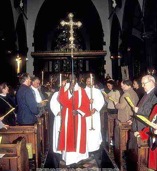Leadership in a Culture of Cowardice (part ten)
Where and when did the role of Pastor become so closely associated with the characteristics of terrible leadership: anemic, people-pleasing, comfort-oriented, weakness-honoring, safety-bound, consensus-collecting, approval-seeking, distress-abating caretaking?
 How did we get from the decisive, principle-inspired boldness of Jesus with the money-changers [Mt 21], Paul and the riot in Ephesus [Ac 19], and Peter on the first Pentecost [Ac 2] to this?
How did we get from the decisive, principle-inspired boldness of Jesus with the money-changers [Mt 21], Paul and the riot in Ephesus [Ac 19], and Peter on the first Pentecost [Ac 2] to this?
How did we move from the frightening judgment of Ananias and Sapphira [Ac 5], the power of God resting on Stephen at his stoning [Ac 6], and the early church leaders arrested for “turning the world upside down” [Ac 17:6] to a religious experience so predictable, routinized, and boring that men of any age, and people under the age of 40 stay away in droves?
Maybe you saw the Flo TV ad that debuted in last February’s Super Bowl.
Sports announcer Jim Nance voice-overs the sad spectacle of Jason Glasby being led around the lingerie department by his girlfriend. Nance says: “Hello, friends. We have an injury report on Jason Glasby. As you can see, his girlfriend has removed his spine, rendering him incapable of watching the game.”
I’m wondering about the injury report on the Church in North America. Who has removed our spine?
Over the last nine installments in this Leadership Courage series, five principles have been offered for pastors who find themselves leading amidst a culture of cowardice.
One: Courageous leadership is not about skill, technique, or knowledge. It is, most of all, about the presence of the leader as he or she moves through life.
Two: Take full responsibility for your own emotional being and destiny.
Three: Promote healthy differentiation within the church or system you lead.
Four: Stand, as an exemplar, in the sabotage and backlash that must come.
Five: Don’t “push on the rope”: the unmotivated are invulnerable to insight.
To this, a sixth: Re-introduce yourself to the adventurous life. Edwin Friedman, in A Failure of Nerve, observes: “What our civilization needs most is leaders with a bold sense of adventure… Our nation’s obsession with safety ignores the fact that every American alive today benefits from centuries of risk-taking by previous generations…every modern benefit from health to enjoyment to production has come about because Americans in previous generations put adventure before safety.”
Do you find incomprehensible the pathway from the behavior of the Church described in the Book of Acts and that of most any Sunday morning gathering in the US today?
How on earth did the Church get from vibrant, exciting, world overturning, status-quo challenging, Kingdom of God advancing powerhouse to predictable, regimented, backward-looking, tradition-bound, safety-dominant, repository of religious relics?
 When were ministers of the Gospel transformed from courageous, God-trusting, whole-hearted, catalytic change agents to … to … well… providers of religious education and entertainment, chaplains of religious tradition, scholar-rhetoricians, and caregivers to those who claim to follow Christ?
When were ministers of the Gospel transformed from courageous, God-trusting, whole-hearted, catalytic change agents to … to … well… providers of religious education and entertainment, chaplains of religious tradition, scholar-rhetoricians, and caregivers to those who claim to follow Christ?
What has become of adventure?
I’m not advocating that we risk for the thrill of it, that we put ourselves in harm’s way for the emotional rush some get when they do dangerous things, or that we behave erratically just to break up the boredom. I’m inviting you to the adventurous life for the advancement of God’s reign and rule in your community. This is not adventure for adventure’s sake. It’s returning to the biblically-normal life of risk and trust as we presence the way of Jesus in a culture more dark and desperate than any of us may fully appreciate.
The Adventurous Life
What an adventure it could be to…
trust Christ as you call people to distinctively demonstrate the way of Jesus to the world.
trust the Father as you lead your people off the church campus to love people and meet real needs right in your community.
trust the Holy Spirit as you confront sin so clearly and confidently those within your sphere of influence regain their capacity to blush. [Jer 6:15]
invite your people to take responsibility for their own well-being and destiny in Christ, serving their commitment to mature in Christ-likeness.
love your spouse so consistently and spectacularly that no one would wonder if the congregation had taken her spot in your heart.
break up whatever fallow ground there is in your own heart [Jer 4:3], to commit to love as if you’ve never been hurt [Lk 23:34], to reach to reconcile with those from whom you’re now estranged [Rom 12:18]…and do it all in full view of your congregation, so they can learn to live like Jesus from your example as well as your preaching [1 Pt 5:3].
The Adventurous Life
What might be gained were you to love that elder enough to challenge the irritating and demeaning way he engages those around him?
What benefits could accrue if you were really to challenge your people to a lifestyle of financial sacrifice until it becomes the norm? What do you think we in the Church are perpetuating when 60-80% of long-time church attendees give nothing in return for the services and benefits they receive? When fewer than ten percent of Church members actually tithe? Why, I wonder, do we take pride in attendance numbers when most of those who come contribute neither time nor money to the welfare of the community of faith, let alone the waiting and watching community outside our doors?
The Adventurous Life
If you are in the religious education and entertainment business I can understand why you’d eschew adventure and risk. But, if you’re in the people-development business, committed to make mature followers of Jesus, I’m not sure there’s any other way.
Are you?

that a boy…nice to be living an adventure with you. Keep up the good work of calling the best from within each of us. May God give us more strength and FAITH!